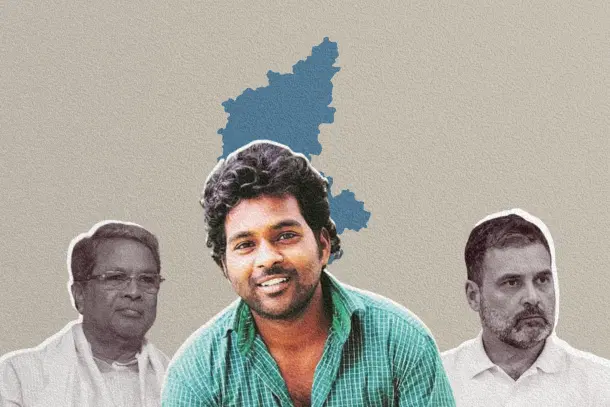Politics
Why Rohith Vemula Bill Is Tool For Polarisation, Not Social Justice
Tejashwini V and Aditya Bharadwaj
Jul 21, 2025, 02:35 PM | Updated 02:35 PM IST
Save & read from anywhere!
Bookmark stories for easy access on any device or the Swarajya app.


In the upcoming monsoon session, the Congress government in Karnataka is gearing up to table the Karnataka Rohith Vemula (Prevention of Exclusion or Injustice) (Right to Education and Dignity) Bill, 2025.
Marketed as a bulwark against caste-based discrimination in higher educational institutions (HEIs), the bill cloaks itself in the noble rhetoric of social justice. Yet, beneath its surface lies a dangerous gambit, one that threatens to deepen caste divides, pit the General Category (GC) against marginalised groups, and erode the fragile bonds of inter-caste harmony.
By invoking the tragic suicide of Rohith Vemula, a University of Hyderabad scholar, the Congress is wielding emotional symbolism to push a law that risks institutionalising reverse discrimination, choking academic freedom, and fostering a climate of fear and mistrust. Far from uniting, this bill is poised to fracture Karnataka’s social fabric, turning campuses into caste battlegrounds.
A Cynical Play on Tragedy
The bill’s name is no accident. Rohith Vemula’s 2016 suicide was a heart-rending moment that exposed the persistent scourge of casteism in India’s academic institutions.
Here's the catch. The Congress decided to name the bill after him, despite a 2024 Telangana Police closure report debunking claims of caste-based harassment as the cause of his death. This reeks of opportunism. This is not about honouring Vemula’s memory but about exploiting a tragedy to galvanise support among Scheduled Castes (SCs), Scheduled Tribes (STs), Other Backward Classes (OBCs), and minorities.
The bill, driven by Rahul Gandhi’s directive to Chief Minister Siddaramaiah, is a top-down imposition, crafted with little consultation and dripping with electoral motives. It is a page from the Congress’s well-worn playbook of identity politics, reminiscent of the ill-fated Communal Violence Bill, which sought to empower some communities at the expense of others.
The bill’s provisions are sweeping and vague, covering all HEIs in Karnataka: public, private, and deemed universities. It mandates that institutions remain “open to all classes, castes, creed, gender, or nation,” with offences like “direct or indirect discrimination” against SC, ST, OBC, or minority students classified as cognisable and non-bailable.
Offenders face up to a year in prison and a ₹10,000 fine for a first offence, escalating to three years and ₹1 lakh for repeat violations. Victims can claim up to ₹1 lakh in compensation before a trial even begins, while institutions risk losing state funding, and their heads face personal liability.
These measures, while sounding righteous, are a masterclass in overreach, inviting misuse and sowing division.
Redundancy and Dilution of Justice
The Rohith Vemula Bill is not only divisive but redundant. The Scheduled Castes and Scheduled Tribes (Prevention of Atrocities) Act, 1989, already offers robust protections against caste-based discrimination, including in educational settings.
With clear definitions and stringent penalties, the Atrocities Act is a targeted shield for Dalits and Adivasis, addressing their unique historical oppression. In contrast, the Rohith Vemula Bill’s inclusion of OBCs and minorities muddies the waters, diluting the focus on those most in need.
Worse, its vague language lacks the safeguards embedded in the Atrocities Act, creating a perverse scenario where SCs and STs could themselves be accused of discrimination by other groups. This undermines the principle of treating unequals unequally, as upheld by multiple Supreme Court rulings, and risks pitting 94 percent of Karnataka’s population, namely SCs, STs, OBCs, and minorities, against the 6 percent General Category.
The bill’s expansive scope invites abuse. By allowing complaints from a wide net of individuals, including parents, siblings, colleagues, or even distant relatives, and bypassing internal grievance mechanisms, it lowers the bar for frivolous allegations.
A heated debate in a classroom, a disagreement over hostel allocations, or a misinterpreted comment could escalate into a non-bailable FIR, branding the accused as casteist without due process. As a retired Karnataka High Court judge warned, "Laws that presume guilt based on identity are a betrayal of justice."
The fear of such accusations will stifle open dialogue, deter inter-caste interactions, and transform universities into legal minefields where every word is weighed for potential offence.
A Chilling Effect on Fraternity
The bill’s punitive measures extend beyond individuals to institutions, threatening to withdraw state funding from non-compliant HEIs.
This draconian clause holds entire universities hostage for the actions of a few, risking financial ruin and punishing uninvolved students and faculty. Private institutions, already burdened by regulatory overreach, may scale back operations or deter out-of-state and NRI students, undermining Karnataka’s reputation as an educational hub.
The bill’s failure to define “discrimination” or “higher educational institutions” with precision only amplifies its potential for misuse, turning academic spaces into arenas of suspicion rather than sanctuaries of learning.
This is not a hypothetical fear. In Maharashtra, the 2019 implementation of stringent anti-caste measures under the Maharashtra Prohibition of Social Boycott Act led to a surge in complaints, many frivolous, that strained institutional resources and deepened mistrust.
Faculty reported hesitancy to engage with students from different communities, fearing misinterpretation, while students self-segregated to avoid potential conflicts. The result was a chilling effect on inter-caste interactions, the opposite of fraternity.
Karnataka’s bill, with its broader scope and harsher penalties, risks replicating this divisive outcome, entrenching caste identities rather than dissolving them.
A Path Forward
No one disputes caste-based discrimination in India’s educational institutions, even if sporadic. The suicides of students like Payal Tadvi and Darshan Solanki are grim reminders of the need for reform.
But the Rohith Vemula Bill is a misstep, a blunt instrument that exacerbates tensions rather than resolving them. Its vague provisions, lack of safeguards, and potential for misuse threaten to deepen communal divides and deter the very inter-caste interactions it claims to foster.
The United Nations special rapporteurs, while acknowledging the bill’s intent, have rightly criticised its lack of clarity and community consultation, urging alignment with international human rights standards.
Karnataka must chart a different course. Strengthening existing mechanisms, like the University Grants Commission’s 2025 Equity Regulations, which mandate Equal Opportunity Centres, would address discrimination without polarising communities.
Robust grievance redressal systems, mandatory sensitisation programmes, and transparent reporting could foster inclusivity without criminalising interactions. True social justice demands fairness for all, not a lopsided framework that breeds resentment and fear.
A Call for Unity
Karnataka stands at a precipice. The Rohith Vemula Bill, draped in the garb of social justice, is a wolf in sheep’s clothing, a divisive ploy that risks entrenching caste fault lines and undermining the constitutional ideal of fraternity.
Siddaramaiah’s government must abandon this flawed legislation and pursue reforms that unite rather than divide. Bharat’s universities should be crucibles of ideas, where merit and dialogue transcend caste.
By rejecting this bill, Karnataka can honour the true spirit of equality, ensuring that no student fears to dream, debate, or belong.
Tejaswini V is a policy consultant specialising in economic and foreign affairs. An alumna of the London School of Economics, she has experience in agriculture, textiles and domestic policy research. Aditya Bharadwaj is an Advocate at the Bombay High Court and a public policy professional.





